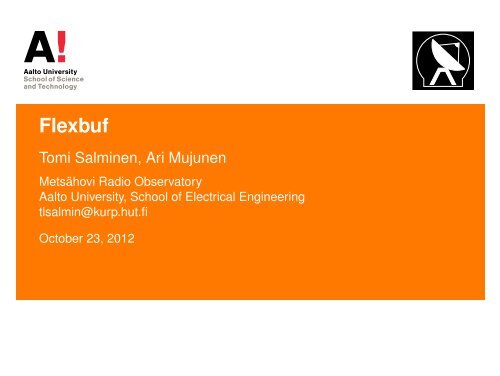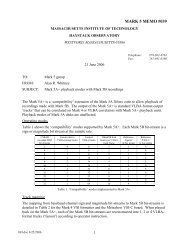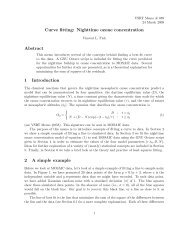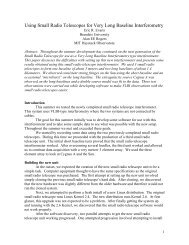Flexbuf - MIT Haystack Observatory
Flexbuf - MIT Haystack Observatory
Flexbuf - MIT Haystack Observatory
You also want an ePaper? Increase the reach of your titles
YUMPU automatically turns print PDFs into web optimized ePapers that Google loves.
<strong>Flexbuf</strong><br />
Tomi Salminen, Ari Mujunen<br />
Metsähovi Radio <strong>Observatory</strong><br />
Aalto University, School of Electrical Engineering<br />
tlsalmin@kurp.hut.fi<br />
October 23, 2012
Introduction on <strong>Flexbuf</strong>f<br />
◮ A NEXPReS EU-project started in 2011 for “Provisioning<br />
High-Bandwidth, High-Capacity Networked Storage on<br />
Demand“ => A high speed data recorder and streamer<br />
◮ Uses Commercial-Off-The-Self (COTS) hardware.<br />
◮ A modern multicore processor<br />
◮ A motherboard with enough PCIE slots to facilitate the<br />
hardware<br />
◮ Efficient SATA-controllers<br />
◮ 10Gb NICS<br />
◮ ~20 x 2TB hard drives<br />
◮ HW-configuration is only a recommendation.<br />
◮ Runs vlbi-streamer software (FOSS GPLv3 licensed @<br />
http://code.google.com/p/vlbi-streamer/)<br />
<strong>Flexbuf</strong><br />
October 23, 2012<br />
2/24
Hardware<br />
<strong>Flexbuf</strong><br />
October 23, 2012<br />
3/24
Hardware on Ara<br />
Motherboard Crosshair IV Extreme AMD 890FX + SB850<br />
chipset<br />
CPU AMD Phenom TM<br />
II X6 1090T<br />
Memory 16GB 667 Mhz (Motherboard acting up.<br />
Target: 1333Mhz)<br />
NIC Chelsio T320 10GbE Dual Port Adapter<br />
NIC Intel 82599EB 10-Gigabit SFI/SFP+ Network<br />
Connection<br />
SATA 2 x SAS2008 PCI-Express Fusion-MPT<br />
SAS-2 [Falcon]<br />
SATA Internal JMicron controllers<br />
HD 22 x 1-2 TB drives<br />
<strong>Flexbuf</strong><br />
October 23, 2012<br />
4/24
Hardware on Watt<br />
Motherboard Supermicro X8DTH<br />
CPU 2 x Intel Xeon E5620 @ 2.4 Ghz<br />
Memory 20GB 1066 Mhz Memory<br />
NIC Intel 82598EB 10-Gigabit AT CX4 Network<br />
Connection<br />
SATA 4 x SAS2008 PCI-Express Fusion-MPT<br />
SAS-2 [Falcon]<br />
HD 36 x 2TB drives<br />
<strong>Flexbuf</strong><br />
October 23, 2012<br />
5/24
Hardware<br />
<strong>Flexbuf</strong><br />
October 23, 2012<br />
6/24
Challenges<br />
◮ Ye olde spinning hard drives maximum rate is between<br />
60-120 MB/s<br />
◮ Speeds slows as data is written to inner tracks due to data<br />
density increasing<br />
◮ Seek times very costly. Need sequential operations.<br />
◮ More hard drives => More hard drives breaking.<br />
◮ Above notes hint that writing data shouldn’t be done in a<br />
rigid architecture<br />
◮ Speeds per drive cannot be guaranteed.<br />
◮ A faulty hard drive should not be able to slow down nor fail<br />
a recording.<br />
<strong>Flexbuf</strong><br />
October 23, 2012<br />
7/24
◮ TCP/IP flow-control ramps speed up too slow, one packet<br />
lost will drop speed back to minimum.<br />
◮ The FPGA packetizers are not programmed for the<br />
TCP-procedure.<br />
◮ Problems like buffer bloat in TCP are currently being<br />
addressed in kernel development<br />
◮ Kernel hides TCP and UDP socket differences almost<br />
completely<br />
◮ Use UDP-packets. Small packet loss is accepted.<br />
◮ UDP packet loss in short connections is rare on modern<br />
hardware<br />
◮ 1500 Byte packets @ 10 Gb/s ≈ 900k packets per second.<br />
NIC interrupt rates can be an issue.<br />
◮ Without using special drivers the kernel socket buffer<br />
needs to be emptied before overflow<br />
◮ Receiving thread shouldn’t be blocked or too heavy.<br />
◮ With special drivers somebody needs to keep them<br />
updated and working with newer kernel or else..<br />
<strong>Flexbuf</strong><br />
October 23, 2012<br />
8/24
◮ Special socket options like rxring and fanout available in<br />
newer kernels.<br />
◮ Direct copy to memory and splitting of work to multiple<br />
threads. Just what we need, except..<br />
◮ ..Interrupt rates go up to ≈ 80% on 6Gb/s<br />
◮ ..Massive packet loss on fast streams.<br />
◮ Problems most likely due to dropping interrupt mitigation<br />
stuff on driver and the features dev-status.<br />
◮ Implemented once for vlbi-streamer testing, but not<br />
maintained<br />
◮ Network connections will keep evolving.<br />
◮ A hardware specific solution will be obsolete relatively fast.<br />
◮ Requires reimplementation and yet another project.<br />
◮ Same thing with writing to non-volatile memory<br />
◮ SSDs are becoming affordable. A hardware specific<br />
solution would be very different<br />
<strong>Flexbuf</strong><br />
October 23, 2012<br />
9/24
VLBI-streamer<br />
◮ A hardware independent recorder and streamer.<br />
◮ Hard drives as a pools of resources, used sequentially<br />
when reserved.<br />
◮ Memory split into file size (256MB-512MB) buffers.<br />
◮ Memory buffers as threads that handle disk writing/reading<br />
◮ Receiving thread only fills buffers.<br />
◮ Modular<br />
◮ Disk write-ends can be changed without changes to main<br />
program<br />
◮ Same with the network side<br />
<strong>Flexbuf</strong><br />
October 23, 2012<br />
10/24
◮ Uses a schedule (eg. VLBI session)<br />
◮ Single invocation still available: ./configure<br />
–enable-daemon=no<br />
◮ Arbitrary number of receive/send sessions active.<br />
◮ Real-time sending and delayed sending of recording.<br />
◮ Software resiliant to hard drive fails. (Only on receive side<br />
atm.)<br />
◮ Packet resequencing framework.<br />
◮ Easy to use (Please help by testing it and giving feedback)<br />
<strong>Flexbuf</strong><br />
October 23, 2012<br />
11/24
free<br />
busy<br />
loaded<br />
Scheduler<br />
Timed start<br />
Grab new<br />
Memory buffers<br />
Buffer<br />
Buffer<br />
Buffer<br />
Buffer<br />
Buffer<br />
Buffer<br />
Buffer<br />
Buffer<br />
Buffer<br />
Buffer<br />
UDP Receiver<br />
Socket<br />
Buffer<br />
Buffer<br />
Buffer<br />
Buffer<br />
Grab next<br />
Buffer<br />
Receiving packets<br />
Buffer<br />
Buffer<br />
Buffer<br />
Buffer<br />
Buffer<br />
Writing<br />
Writing<br />
Reading<br />
Writing<br />
Sending packets<br />
Recpoints<br />
HD<br />
HD<br />
HD<br />
HD<br />
UDP Sender<br />
Socket<br />
HD<br />
HD<br />
HD<br />
HD<br />
HD<br />
HD<br />
HD<br />
HD<br />
HD<br />
HD<br />
<strong>Flexbuf</strong><br />
October 23, 2012<br />
12/24
Uses<br />
◮ Main design purpose is station-side buffering<br />
◮ Eg. record @ 8Gbps from antenna and stream @ 1Gbps to<br />
correlator.<br />
◮ Long time storage. Set rec points on RAID arrays for<br />
redundancy.<br />
◮ Correlator buffer.<br />
◮ Receives multiple streams from stations for correlation<br />
◮ LOFAR buffers.<br />
<strong>Flexbuf</strong><br />
October 23, 2012<br />
13/24
Tests<br />
◮ Long network tests show high speed with no packet loss<br />
◮ 12h recording test with 8Gb/s completed without packet<br />
loss on multiple sites.<br />
◮ Utilizes only a small amount of resources<br />
◮ CPU clocks to spare (~80% usage on 6 core system with<br />
max 600%<br />
◮ Less than half of 22 disks in use. (More than enough to<br />
stream old recordings simultaneously)<br />
◮ Offline throughput tests show architecture working close to<br />
HW-limit. Tests without network side:<br />
◮ ~32.9 Gb/s with 32 disks on a Xeon.<br />
◮ ~17 Gb/s with 22 disks on a AMD Phenom II X6 system.<br />
◮ Offline here means: syscall recv commented out, make<br />
system think its continuosly receiving packets<br />
◮ Note that this also doesn’t include copy from kernel socket<br />
receive buffer to memory.<br />
<strong>Flexbuf</strong><br />
October 23, 2012<br />
14/24
<strong>Flexbuf</strong><br />
October 23, 2012<br />
15/24
<strong>Flexbuf</strong><br />
October 23, 2012<br />
16/24
Percentage<br />
600<br />
500<br />
400<br />
300<br />
200<br />
100<br />
CPU usage<br />
CPU usage<br />
0<br />
0 200 400 600<br />
Time(s)<br />
800 1000 1200<br />
<strong>Flexbuf</strong><br />
October 23, 2012<br />
17/24
<strong>Flexbuf</strong><br />
October 23, 2012<br />
18/24
<strong>Flexbuf</strong><br />
October 23, 2012<br />
19/24
<strong>Flexbuf</strong><br />
October 23, 2012<br />
20/24
<strong>Flexbuf</strong><br />
October 23, 2012<br />
21/24
Utilities<br />
◮ Service (aka. Daemon) scripts: Ready after boot.<br />
◮ Recpoint formatting/tuning/mounting script.<br />
◮ Hugepage initialization<br />
◮ Parsing of logs to gnuplottable format<br />
◮ Plotting of parsed logs. (Daily integration tests for<br />
regression testing etc.)<br />
◮ Queueing scripts.<br />
◮ vbs_record nameoftest 300 -s 47338 -q vdif<br />
◮ Extraction of schedule from snp-file.<br />
◮ vbs_delete, vbs_ls..<br />
<strong>Flexbuf</strong><br />
October 23, 2012<br />
22/24
Development and faults<br />
◮ Delayed sending (eg. send packet every 35 ms) is<br />
currently done in busyloop<br />
◮ Regular kernel min. sleep times tend to be ~50ms.<br />
◮ Multiple sending threads clog system with busy loops.<br />
◮ TCP congestion control etc. actually handle this<br />
automatically.<br />
◮ Needs QoS<br />
Solution 1. An interrupt facility with function pointers.<br />
◮ Accuracy to be tested.<br />
Solution 2. Kernel socket option for rate control<br />
Solution 3. Kernel Pre-emption and nanosleep (Thanks Paul)<br />
◮ Set sender threads to higher priorities<br />
◮ Kernel pre-emption needs to be set => Kernel tuning<br />
◮ ./configure –enable-nanosleep=yes<br />
<strong>Flexbuf</strong><br />
October 23, 2012<br />
23/24
Development and faults<br />
◮ Packet size change requires /etc/init.d/vbs_daemon restart<br />
◮ DIRECT I/O requires 4096 byte alignment<br />
◮ Buffer division for write granuality<br />
◮ 512MB<br />
≈ 8.5s reservation for a hard drive.<br />
60MB/s<br />
◮ Nasty for simultaneous receive and send, since send might<br />
just require that specific hard drive.<br />
◮ Blocking and priorities on the TODO-list.<br />
◮ Granuality degrades large raid performance<br />
◮ Write becomes small per disk.<br />
◮ Accesses are fast, so no granuality needed.<br />
◮ Packet size alignment<br />
◮ Filling takes max overhead 9000−1500<br />
≈ 0.003%<br />
256∗1024∗1024<br />
Solution Find divisions for all near some (eg 512) MB spot and<br />
reserve max per buffer.<br />
<strong>Flexbuf</strong><br />
October 23, 2012<br />
24/24
















